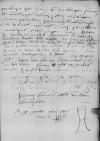Letter #3728
Hans von SICKINGEN, Franz Conrad von SICKINGEN, Ulrich von CZETTRITZ & [Cornelis DE SCHEPPER] to Ioannes DANTISCUSInnsbruck, [1532, November or December]
English register:
This short letter, in three different hands, seems to have been written during a carousal. Hans von Sickingen, Franz Conrad von Sickingen and Ulrich von Czettritz send greetings – in German – to Dantiscus. De Schepper, who is less drunk, writes in Latin on behalf of the others. He comments on their cheerful party and promises that Nibschitz will verbally convey the message of the Sickingen brothers to Dantiscus.
Manuscript sources:
Prints:
| ||||||||
Text & apparatus & commentary Plain text Text & commentary Text & apparatus
Reverendissimo Domino
Genediger Her.
Hansz vo(n) Sickingen, Francz vo(n) Sickingen, Ulrich Zettricz entbieten ewern genaden iren willick dinst.
Das ubrick wurt written over ck⌈cktt written over ck⌉ euch her Ada written over e⌈eaa written over e⌉m Zewbiczck selbst sagen etc.
Mein Hanis van Sickingens hantschrift als kantzlers stet hie(?) under adscribed, in the hand of other⌈Mein
E(wer)(?) G(naden) gwtter
Addition in the hand of Cornelis De Schepper:
Reliqua dominus Ioannes et Franciscus Conrardus de Sichingen commiserunt dicenda domino
Ex
Dominus Ceystritz heri bibit pro salute multorum et sui non fuit oblitus. Osculatus est pedes non pontificis maximi, s(ed) or s(cilicet)⌈s(ed)s(ed) or s(cilicet)⌉ cuiusdam formosae mulieris.
Et bene vale.


 BCz, 1595, p. 588
BCz, 1595, p. 588